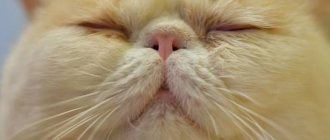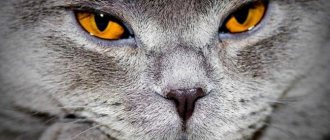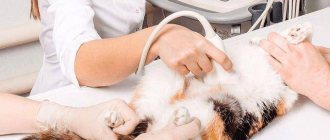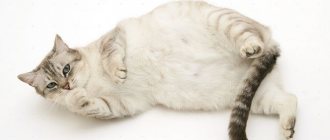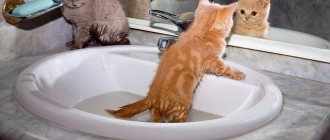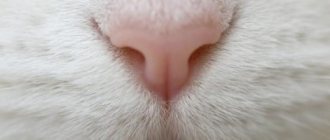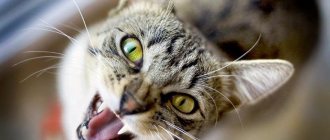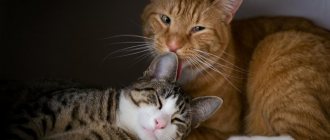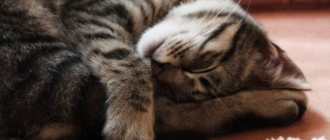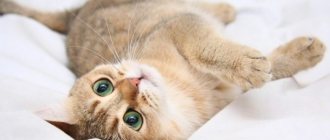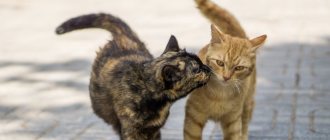Animals also get sick, but unlike people, they cannot tell where and what hurts them. Therefore, the owner needs to note signs that are abnormal for his pet - excessive restlessness, unnaturally long periods of sleep, increased excitability, appetite, stool, diuresis, discharge from the nose, eyes, mouth and other points. Owners, especially inexperienced ones, have many questions about their cat’s nose. What should it be like? Cold or warm, wet or dry?
And if a cat has a dry and hot nose, does this mean that the pet is sick? In fact, a cat’s dry nose in itself does not indicate illness, but in combination with other signs it may indicate problems in the animal’s health.
What kind of nose should a healthy pet have?
Many owners are concerned with the question of what a healthy kitten’s nose should be like. First of all, a healthy nose is a moist and cool nose that glides a little. This is due to the nature of the animal. In fact, cats are predators for whom the nose is the main assistant in the hunt. The wet organ helps determine where the wind is blowing - this is necessary so that the victim does not smell the cat's scent. This is why having a wet nose is important.
When determining the health of a pet, it is necessary to take into account the type of activity of the kitten. If he has just woken up or was engaged in active play, then he may experience a dry nose. This is due to the fact that pets have a higher body temperature than their owners, and therefore moisture evaporation occurs more intensely. Physiological causes of dryness are:
- dream;
- awakening;
- active games;
- hot room;
- sharp fear;
- prolonged exposure to the sun;
- sedentary lifestyle.
Cat nose, basic functions
A cat's nose is a kind of indicator of the health and physiological state of furry pets. The olfactory organ in cats, like in humans, has a complex structure. The nose is necessary for the adaptation of animals to the environment; it allows representatives of the cat family to navigate in space and determine the temperature of food.
With the help of the cat's nose, the cat perceives third-party odors . At the same time, taking into account the hunting instinct inherent in nature, thanks to an acute sense of smell, cats can determine the location of their “prey”. In some cases, the nose allows furry pets to navigate their surroundings. In addition, a kitten's sense of smell is several times better than a person's sense of smell.
© shutterstock
What are the signs that require contacting a veterinarian?
If the following symptoms are detected in a kitten, you should consult a veterinarian to identify the causes of your pet’s illness:
- malaise, lethargy, apathy;
- dry and hot nose;
- cold and pale nose;
- change in organ color (blue, yellowish, red, white).
The owner should know that a pale and cold organ in a kitten is a sign of:
- chronic illness;
- hypothermia;
- stress;
- low body temperature;
- poisoning;
- complete lack of appetite.
A white and warm nose is a sign of a disruption in the kitten’s circulatory system. The blue and hot organ talks about:
- heart failure;
- inflammation of the respiratory organs;
- oxygen starvation.
When a kitten has a hot and red organ, this is a sign:
- infectious disease;
- rhinitis;
- mechanical damage.
If a kitten has a hot, dry nose and warm ears, then this is not necessarily a sign of illness, because heat exchange has not yet been established in babies, and their body temperature is higher than that of an adult pet. This may be due to the work of the body and its protection from hypothermia.
What signs will help determine the onset of the disease?
In addition to the signs listed above, the kitten also exhibits other symptoms indicating the onset of the disease. These include:
- increasing or decreasing the number of trips to the toilet;
- diarrhea or bloody stools;
- vomit;
- increased anxiety of the animal;
- hair loss;
- increased thirst;
- cardiopalmus;
- deep breathing;
- nasal discharge.
If you have these symptoms, you should consult a specialist; only he can make a correct diagnosis and prescribe treatment. You should not self-medicate, as this will only worsen the situation.
Often a kitten's dry nose is an indicator of intestinal problems, namely the presence of hair in the gastrointestinal tract. This is the only indicator of this problem.
What should the owner do to help the cat?
The first thing the owner needs to do if he discovers a dry nose in a cat is to observe its general condition. Maybe she had a fever. Hot ears confirm the presence of a high temperature. It would be useful to take your temperature several times a day; this should be done rectally. Readings up to 37-38 degrees are considered normal; if it rises above 38.5, then you need to contact a veterinarian. When a kitten’s temperature reaches too high, you can help him with the following manipulations:
- wet the kitten’s fur with water from time to time;
- place a cold pack under the neck or on the inner thigh;
- provide access to clean and fresh water.
Only a veterinarian can determine why the temperature has risen, and only he can give advice on the choice of antipyretic drugs.
Now you know why a cat has a dry nose. There can be many reasons for this, and they are not always signs of illness. If they coincide with a dry nose, then you should not wait for the kitten’s well-being to improve on its own and it is better not to postpone a visit to the veterinarian.
What can a cat do to prevent dry nose?
To prevent pathologies accompanied by dry nose, there are several rules:
- Creating a cozy atmosphere in the apartment. To do this, it is necessary to regularly carry out wet cleaning of the premises, ensure that there is free access to water, and maintain optimal humidity in the apartment using special devices;
- Constantly monitor the animal’s well-being, pay attention to changes in condition;
- To identify the early stages of pathologies, be observed by a veterinarian at least once a year for the purpose of prevention;
- Get vaccinated and antiparasitic treatment.
If you notice the first signs of a deterioration in your animal’s health, don’t delay! Seek help from a doctor and under no circumstances self-medicate!
